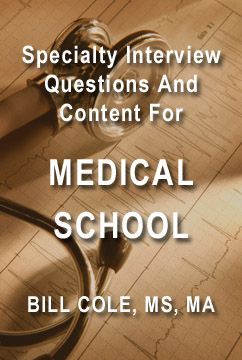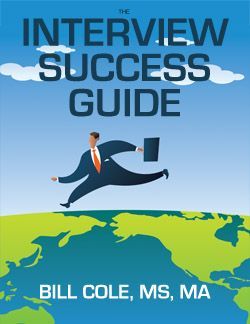What appears to be common sense or obvious about medical school interviewing is often quite counterintuitive. As a medical school interview coach of many years, most clients who come to me are still harboring many dangerous ways of thinking about their upcoming medical school interviews. These incorrect thoughts cause all sorts of troubles for them when they prepare to interview, and in the actual interview. I designed this so you can easily see the incorrect thought, why it is a problem (and how this is perceived to be undesirable by the interviewer) and most importantly, what you can do to PREVENT this from happening. 874 words.
Four Of The Top 25 Deadly Mistakes Candidates Make
That Ruin Medical School Interviews
And How to Avoid Them
Bill Cole, MS, MA
Founder and CEO
William B. Cole Consultants
Silicon Valley, California

You have some medical school interviews coming up and I'm sure you've checked out www.studentdoctor.net, read interview instructional articles on the web, spoken to friends who have had medical school interviews, or who are in medical school, and even met with your school counselor to ask how medical school interviews are run. This is all good due diligence. As a medical school interview coach of many years, most clients who come to me have done all the above, yet they are still harboring many dangerous ways of thinking about their upcoming medical school interviews. These incorrect thoughts cause all sorts of troubles for them when they prepare to interview, and in the actual interview.
I want you to read this article carefully and understand that what appears to be common sense or obvious about medical school interviewing is often quite counterintuitive. I designed this so you can easily see the incorrect thought, why it is a problem (and how this is perceived to be undesirable by the interviewer) and most importantly, what you can do to PREVENT this from happening.
Let's get underway!
- THE DEADLY MISTAKE IN THINKING: "When the interviewer asks me about what I would do in some obtuse, unusual medical scenario, I'll tell them I would call the Attending or the Chief of Staff and defer to them."
WHY THIS IS A PROBLEM: This shows you are avoiding taking responsibility and are afraid to make a decision. Being a physician is all about leadership and courage in making the tough decisions.
HOW TO AVOID IT: Saying you would get a consult with key staff members is smart. But you need to accept responsibility for the situation. Say what you would do, and why, and stand by that reasoning. Show that you welcome the responsibility of being a physician. - THE DEADLY MISTAKE IN THINKING: "If the interviewer asks me what specialty I am considering, and why, I'll say dermatology because their schedule is more controllable, they have fewer emergencies, and they can make good money with cosmetic procedures and products."
WHY THIS IS A PROBLEM: You gave an honest answer. And these facts are true. Unfortunately, if your answer focuses primarily on YOU, and what YOU will get out of medicine, the interviewer will see you as self-serving, and as not having the patient's interests as your primary focus.
HOW TO AVOID IT: You can honestly state the specialty you prefer, but give reasons that are more altruistic or professional. Such reasons may include that you admired a doctor in that specialty who helped you and your family, or that it is an under-served specialty, or that the doctor you shadowed really got you excited about their specialty, or that you like the fast-paced, eclectic nature of it (being a hospitalist, or emergency room physician for example). - THE DEADLY MISTAKE IN THINKING: "Since my parents and relatives are in the medical field, I'll play that up, and that should impress the interviewer."
WHY THIS IS A PROBLEM: Letting the interviewer know that you come from a medical or health profession family does help, but it's not enough. The interviewer may even view your attitude as arrogant, flip, or see you as feeling entitled.
HOW TO AVOID IT: Certainly mention this fact, but don't make it a central point as a "given" that being a legacy proves you also can be a physician. Instead, talk about how you have discussed the medical world with your parents for years, and how this gives you a deep level of understanding of what you will be going into, and has allowed you to really eliminate any lingering doubts about medicine you may have had otherwise. - THE DEADLY MISTAKE IN THINKING: "I'll tell the interviewer that since I did so well in undergraduate school, medical school should be fine if I just stay focused."
WHY THIS IS A PROBLEM: The interviewer is thinking you really don't get it. Medical school is FAR more challenging than undergraduate school, and many smart people have trouble if they don't adjust.
HOW TO AVOID IT: Tell the interviewer that you will make any and all necessary sacrifices to succeed in medical school. You'll cut back on social, sport and travel activities. You will hire a specialist in medical school study success to help you set up a smart study system. You will apply yourself like never before and you are determined to succeed.

Now you have seen four of the 25 most common errors in thinking when it comes to medical school interviews. Perhaps you are surprised that what you have been told or what you have read before this article did not tell you about all of these. Nonetheless, now your eyes have been opened to the many potential pitfalls around medical school interviews. Review these errors in thinking, do your due diligence and I know you can avoid each one of these so you come across as a highly desirable candidate for medical school.
This article is an excerpt from the full 4054 word article, The Top 25 Deadly Mistakes Candidates Make That Ruin Medical School Interviews and How to Avoid Them. To see this full article, simply start interview coaching with us and you will receive, at no additional charge, the book, The MEDICAL SCHOOL INTERVIEW SUCCESS MANUAL: Specialty Questions And Content For MEDICAL SCHOOL INTERVIEWS. The full article of 25 deadly mistakes is in this book.
This 49-page document has over 134 interview questions across 17 topical areas relating to medical school. In addition, there are eight articles of specialized content for medical school that will assist you in answering key questions, and also 37 questions you can ask the interviewer, and 18 questions you can ask a medical professional in an informational interview.

You also may be interested in the Interview Success Guide, an indispensable tool you need to make your interview campaign a big success. This is a 216-page master blueprint that helps you understand and navigate the interview process so you can mount a successful interview campaign. This book has deep, insightful and immediately applicable interview wisdom that demystifies the world of interviewing. It also has over 400 questions, listed by category, for a variety of careers and jobs, which you could be asked in an interview. There are also over 1200 interview task reminders, questions and guidelines in checklist form so you leave nothing to chance in your job hunt. This guide gives you a step-by-step approach to mastering the interview process. Everything you need to do, from the moment you begin your job hunt to when you accept the position, is covered. We have thought of everything you could possibly need to know to conduct a comprehensive, smart job hunt campaign. Learn more about The Interview Success Guide and purchase it in pdf format, downloadable directly from this website. The Interview Success Guide eBook is also available in Amazon Kindle format and Barnes & Noble Nook format.
To learn more about how medical school interview coaching can help you, visit mentalgamecoach.com/Services/MedicalSchoolInterviewCoaching. To learn about how interview coaching can help you in other situations such as media presentations, exams and job interviews visit mentalgamecoach.com/Services/InterviewCoaching.
Bill Cole, MS, MA, a leading authority on peak performance, mental toughness and coaching, is founder and CEO of William B. Cole Consultants, a consulting firm that helps organizations and professionals achieve more success in business, life and sports. He is also the Founder and President of the International Mental Game Coaching Association (www.mentalgamecoaching.com), an organization dedicated to advancing the research, development, professionalism and growth of mental game coaching worldwide. He is a multiple Hall-Of-Fame honoree as an athlete, coach and school alumnus, an award-winning scholar-athlete, published book author and articles author, and has coached at the highest levels of major-league pro sports, big-time college athletics and corporate America. For a free, extensive article archive, or for questions and comments visit him at www.MentalGameCoach.com.
Free Re-Publishing Rights For This Article
You have our advance permission to republish this article, as long as you do not sell it. The author's name, web address (MentalGameCoach.com) and copyright notice (Copyright © Bill Cole, MS, MA) must appear in all reprinted articles. If the article appears on a website or in an e-zine, the article must include a link to a page in the MentalGameCoach website. We would also appreciate your including the author's bio and full contact information in your article, although this is not a requirement. For additional information, see our full article re-publishing permission guidelines.
Contact info
39116 Fremont Hub #1302
Fremont, CA 94538 United States
Phone: (510) 270-0311
Email: Bill at MentalGameCoach.com
William B. Cole Consultants name, design and related marks are trademarks of William B. Cole Consultants.
© 1997-2024 William B. Cole Consultants. All rights reserved.
Privacy Policy -
Legal Notices -
Digital Millennium Copyright Act (DMCA) Policies Notice


